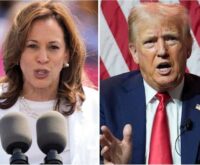By The Associated Press
Foreign high-skilled workers aren’t supposed to take jobs from Americans, but they sometimes do. When companies apply to bring in a foreign worker on an H-1B visa, they are required by the U.S. Labor Department to ensure the new arrivals will not adversely affect similarly employed U.S. workers.
But American workers claim in lawsuits that they have been supplanted by H-1B visa holders doing work for companies like Molina Healthcare in California and Harley-Davidson in Wisconsin.
Experts say the seemingly straightforward requirement to do no harm to U.S. workers is undermined by loopholes and weak enforcement.
Here are five things to know about the H-1B visas and protection guidelines regarding American workers:
1. DISPLACEMENT
The law doesn’t specifically say H-1B workers can’t replace Americans, but it does include some protections, particularly when it comes to companies deemed “H-1B dependent” _ those where 15 percent or more of their U.S. workers are H-1B visa holders. Those companies can’t replace American workers until the H-1B employees have been on the job 90 days.
2. RECRUITMENT
The H-1B dependent firms also must recruit Americans before bringing in foreign workers. However, these requirements are rarely enforced. And many people never learn why they were passed over for a position, or who got the job they applied for. What’s more, most companies are not categorized as H-1B dependent and therefore do not have to follow the displacement and recruitment guidelines.
3. PREVAILING WAGES
The guest workers are supposed to be paid the “prevailing wage” for whatever job they take, in whatever city they work. But the job descriptions listed on the H-1B petitions are vague enough to give employers wiggle room. The government also allows firms leeway in calculating prevailing wages. They can use government data or private industry surveys. U.S. Rep. Zoe Lofgren, a Democrat who represents Silicon Valley, found in 2011 that computer systems analysts working on H-1B visas in her district could be paid a “prevailing wage” of $52,000 a year _ versus the local average computer analyst wage of $92,000.
4. OVERSIGHT ISSUES
Government oversight of the H-1B program is limited and fragmented between half a dozen agencies, making it difficult to enforce legal provisions meant to protect American workers. A Labor Department computer does an initial check as to whether employershave agreed to the commitment to avoid adversely affecting American workers and to follow labor laws, but no human looks at that application.
5. OTHER VISAS
Companies that want to bring in foreign workers have additional options, including the L1 and B1 visas, both of which are unlimited. The L-1 visas allow global companies to transfer workers to the U.S. without paying U.S. salaries. The B-1 visas are supposed to allow foreigners to attend conferences and seminars in the U.S., but federal prosecutors say companies have used them to get around the limit on H-1B work visas. The government also issues an unlimited number of work visas to foreign college students and recent graduates for jobs in their area of study. Those in tech and sciences can work in the United States for more than two years with no minimum salary.










